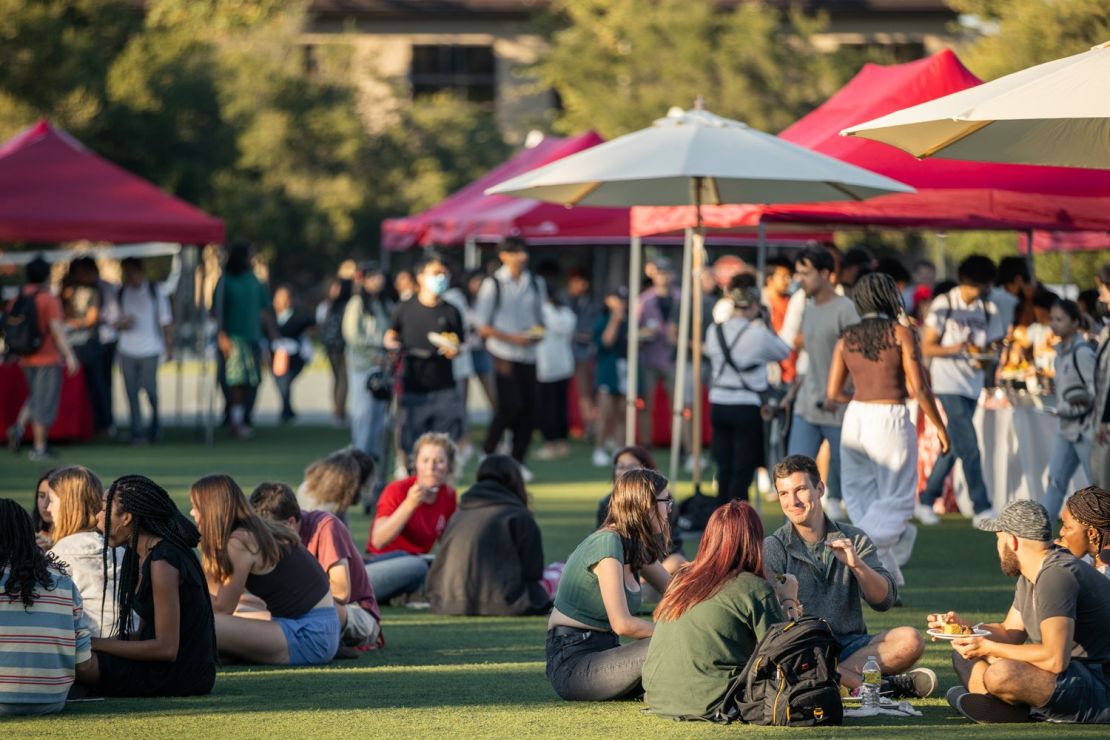As the 2022-23 academic year draws near a close, Stanford continues to work with students to support and enhance student life on campus. This includes implementing improvements to event planning, the undergraduate neighborhoods, and the student judicial charter. Additional enhancements were also announced in a message to students today.

The neighborhoods hosted nearly 800 events this academic year, including a series of welcome barbecues in September. (Image credit: Andrew Brodhead)
The work has been informed by student conversations around what it takes to create and sustain a flourishing campus community.
“As students navigate their undergraduate years, we know that strong friendships and a supportive community are crucial to their well-being,” said President Marc Tessier-Lavigne. “We’ve listened to student feedback and are taking these additional steps to bolster student life on campus. We’re committed to working with students to foster a campus life that is supportive, enriching, and fun, and I can’t wait to see what the next year holds.”
Samuel Santos, associate vice provost for inclusion, community, and integrative learning in Student Affairs, has met with dozens of student groups, Greek organizations, and individuals passionate about building community and support for student life. Those meetings have helped inform the many changes Stanford is implementing and will continue to build on in the coming year.
Key steps the university has recently taken and is taking now include:
- Housing: Providing more choice for undergraduates in the neighborhood assignment process.
- Events: Creating streamlined processes and support for student events, including university funding for security expenses and professional bartending for some large social events, beginning this fall.
- Student accountability: Implementing recently approved updates to make the student judicial system less “one size fits all” for conduct cases and more focused on educational remedies for lower-level violations.
Balancing choice and cohesion
Stanford’s ResX neighborhoods were designed to address student concerns around shrinking friend groups and the annual reshuffling of residential communities. ResX launched in 2021 following the pandemic and recognized the need, after the pandemic disruption to campus life, to foster a cohesive community and provide enhanced programming funds and support.
However, the changes made it harder for some students to live with friends outside of the neighborhoods they were assigned. So this spring, the university launched a pilot program allowing students to change neighborhoods with a group of up to eight friends.
In addition, earlier this month, the university announced the Neighborhoods Task Force, a group of students, faculty, staff, and resident fellows that is charged with recommending long-term changes and enhancements to the neighborhood system. The group’s primary areas of consideration will include housing assignments and neighborhood reassignments, the configuration of buildings within neighborhoods, and what is needed for neighborhoods to foster community and equitably deliver services to students.
Stanford is also looking at ways to augment the many physical spaces available for students in each neighborhood. Over the next year, students and the university architect will be partnering to redesign existing spaces with more casual hangout areas and new outdoor seating and lights.
Streamlining event planning
In the fall and winter quarters, many students shared their concerns about finding spaces and support for planning parties and events, and in meetings with Santos, both undergraduates and graduate students shared that they also wanted more opportunities for social events on weekends.
So, after a pilot earlier this year, the Vice Provost for Student Affairs office announced today that Tresidder Oak would remain available, free of cost, to students for events on Friday and Saturday nights.
Student leaders also requested support in addressing crowd control and sober monitoring at events where alcohol is served. So next year, all student groups will have access to additional event support, including the continuation of a university-funded bartending and security pilot program for large social events.
Staff also continues to refine the party planning process in response to student feedback, most recently from the new ASSU executive team. This includes removing duplicative forms, providing students with checklists, and assigning additional staff to support event planning and publicity.
Already, many traditions have returned to campus, and student attendance at several events, including the frosh, sophomore, and junior class formals, reached an all-time high. The neighborhoods hosted nearly 800 house and council events this year, including eight all-campus events, and major student-led festivals, including Holi, Blackfest, Powwow, and FrostFest, returned with much excitement and fanfare.
Addressing student accountability
In 2022, the Stanford Group Accountability Process replaced the Organization Conduct Board as the accountability process for student groups. And in spring 2023, following concerns from students about how long the process was taking, the university added timeframes to the stages of the process and increased staff in the office that handles cases.
In addition, this spring, a series of campus bodies representing faculty, students, and administration gave final approval to changes to the university’s Judicial Charter related to individual student accountability.
The recommendations were brought forward by the Committee of 12, a group of students, faculty, instructors, and staff charged with examining the Honor Code, Judicial Charter and Process, and interpretations of the Fundamental Standard. Earlier this year, the group solicited ideas and feedback from students through many town halls, office hours, and focus groups.
The changes will allow for a more nuanced approach to alleged violations of student conduct policies, moving away from a one-size-fits-all disciplinary approach. The changes also place a greater emphasis on education for lower-tier infractions and create a more streamlined and accessible process.
“I’d like to thank everyone who has reached out to connect with me this year,” Santos said. “It has been wonderful to hear about your experiences and ideas for Stanford, many of which have shaped our work over the past year. We have made a tremendous amount of progress, and we look forward to more of the same this fall.”